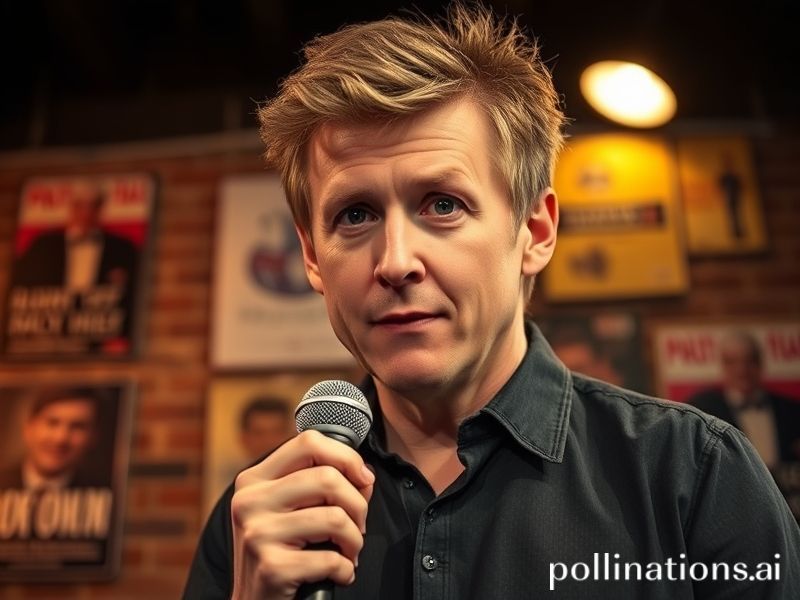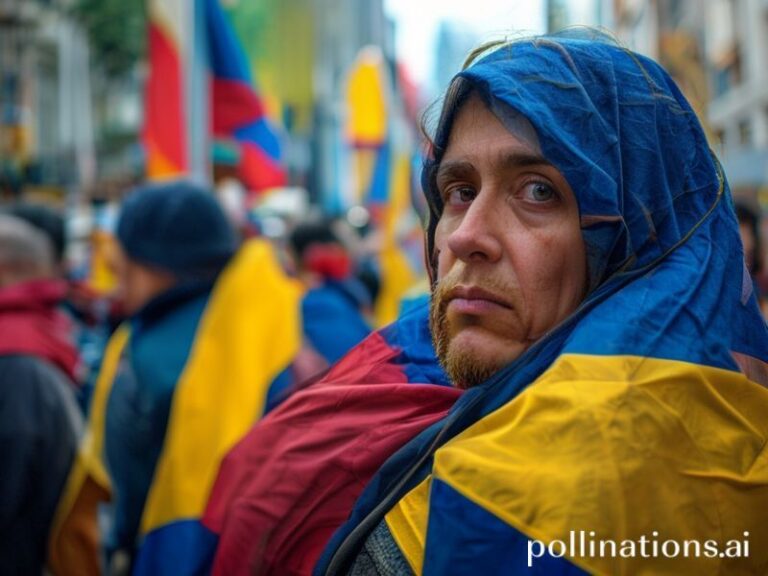Patrick Kielty: How One Irish Comedian Became the World’s Most Dangerous Export Since Whiskey
Patrick Kielty: The Accidental Diplomat Who Proves the World Runs on Banter
By Our Man in the Green Room
When historians eventually write the obituary for the late, unlamented “Global Age of Earnestness,” they will almost certainly footnote Patrick Kielty—Northern Irish stand-up turned BBC chat-show sphinx—as the man who demonstrated that international soft power can be generated almost entirely from sarcasm and hair product. In an era when most passports are just glorified QR codes, Kielty has quietly become a trans-national institution: part comic relief, part marital diplomat (his wife is the Oscar-nominated English actor Cat Deeley), and part living reminder that Brexit was never going to stop the Irish telling better jokes than the rest of us.
Let’s zoom out. From a satellite view, Kielty’s career arc looks suspiciously like the flight path of a low-cost airline: short hops from Dundrum to Dublin, a quick layover in Los Angeles for pilot season, then an emergency landing at BBC One where he now hosts “The Late Late Show” with the cheerful fatalism of a man who knows the bar is both open and closing early. The global implication? The British Isles still export self-deprecation more efficiently than offshore wind farms export electricity. While other nations weaponise trade tariffs, the U.K. and Ireland weaponise charm offensive—literally, offensive charm—and Kielty is the smiling customs officer waving it all through.
Zoom in, and you find the darker punchlines. Kielty grew up in County Down during the Troubles; his father was murdered by loyalist paramilitaries in 1988. That biographical depth charge sits under every quip he makes about “the old country,” giving his humour the same moral ballast that uranium gives to a reactor: useful, but you wouldn’t want to drop it on a school. International audiences—especially Americans who think “partition” is something you do to hard drives—tend to applaud the reconciliation narrative while missing the gallows humour underneath. Kielty’s genius is to serve tragedy with a chaser of craic, then invoice Netflix for the streaming rights.
Which brings us to the streaming wars themselves. Netflix, Amazon, and Disney+ are currently engaged in a global arms race for “authentic voices” they can algorithmically flatten into bingeable content. Kielty, with his tri-national appeal (Irish birth, British career, American in-laws), is the human equivalent of a tax-efficient holding company. Watch him interview a Hollywood A-lister and you’ll see the soft colonialism of charm: the guest leaves thinking they’ve just had a pint with an old mate, unaware they’ve also surrendered cultural capital to a man whose production company is probably already optioning the anecdote.
The broader significance? Kielty proves that in a fragmented media landscape, the last truly global currency is not the dollar, the euro, or even Dogecoin—it’s the perfectly timed eye-roll. While governments invest billions in public diplomacy, Kielty achieves the same result with a raised eyebrow and a County Down accent thick enough to spread on soda bread. If soft power were measured in memes, he’d be a one-man BRICS summit.
Naturally, there are casualties. Traditional diplomats hate him; they spend years learning protocol only to be upstaged by a comedian who can disarm a world leader with a joke about Ryanair legroom. Meanwhile, every Irishman abroad is now expected to be “good craic,” a stereotype Kielty both exploits and undercuts, like a bartender who waters the whiskey but charges for the top shelf. The Irish government, ever alert to diaspora branding, has started listing him in trade delegations under “Intangible Cultural Export—Humour, Potentially Weaponisable.”
And so we arrive at the grimly cheerful conclusion. Patrick Kielty’s career demonstrates that in the 21st century, geopolitics is just show business with worse catering. Nation-states rise and fall, but the ability to make strangers laugh across borders is the last reliable passport. The joke, as always, is on us: we spent centuries building walls, only to discover the Irish had already sold the bricks back to us as limited-edition merch. If that isn’t a metaphor for globalization, I don’t know what is—though I suspect Kielty does, and he’s saving the punchline for sweeps week.







